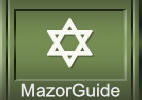|
|
Crohn's Disease
by Yael Rosenberg, RN
Description
Crohn's Disease is a serious inflammatory disease of the
gastrointestinal (GI) tract. It predominates in the intestine
(ileum) and the large intestine (colon), but may occur in any
section of the GI tract.
Symptoms
Abdominal pain, often in the lower right area
• Diarrhea
• Rectal bleeding, which may be serious and persistent,
leading to anemia
• Weight loss
• Fever may occur
• A greater risk of developing colorectal cancer
• Children with Crohn's may suffer delayed development and
stunted growth
Incidence and Carriers
Although environmental factors clearly contribute, there is
strong evidence from studies of twins and affected families that
Inflammatory Bowel Disease (IBD), especially Crohn's disease, has a
genetic basis. Research has shown evidence of a genetic
predisposition to a chronic Inflammatory Bowel Disease (IDB) among
Jewish individuals of Eastern European descent.
Inflammatory Bowel Disease (IBD) is two-to-eight times more common
in Ashkenazi Jews. Genetic factors inherited from the mother may
play an important role in predisposing these individuals to Crohn's
disease. Crohn's disease occurs in all ethnic groups and races.
However, its incidence is highest in Caucasians and Jewish people of
Eastern European (Ashkenazi Jews.) The Crohn's & Colitis Foundation
of America estimates that over 2 million Americans suffer from some
form of inflammatory disease. There is an equal incidence of
IBD in males and females.
Crohn’s Disease is more common in the pediatric practice than
Ulcerative colitis. It peaks in the second or third decade of life.
Cases of Crohn's in infants and young children occur less
frequently. Approximately 25% of all new cases in the population are
less than 20 years of age. There is an increased prevalence of
Crohn's disease among first-degree relatives; however, no specific
habitability pattern has been recognized.
Treatment
• There is no cure for IBD, thus the focus is on
controlling the inflammation.
• Medication – inflammation is controlled through powerful drugs
such as corticosteroids.
• Surgery – to remove inflamed or damaged portions of the
intestines
Nutrition Supplementation - The doctor may recommend nutritional
supplements, especially for children
• whose growth has been slowed. Special high-calorie liquid
formulas are sometimes used for this purpose. A small number of
patients may need periods of feeding by vein. This can help patients
who need extra nutrition temporarily, those whose intestines need to
rest, or those whose intestines cannot absorb enough nutrition from
food.
Testing
Researchers continue to look for more effective treatments.
Examples of investigational treatments include
• Anti-TNF - Research has shown that cells affected by Crohn's
disease contain a cytokine, a protein produced by the immune system,
called Tumor Necrosis Factor (TNF). TNF may be responsible for the
inflammation of Crohn's disease. Anti-TNF is a substance that finds
TNF in the bloodstream, binds to it, and removes it before it can
reach the intestines and cause inflammation. In studies, anti-TNF
seems particularly helpful in closing fistulas.
• Interleukin 10 - Interleukin 10 (IL-10) is a
cytokine that suppresses inflammation. Researchers are now studying
the effectiveness of synthetic IL-10 in treating Crohn's disease.
• Antibiotics - Antibiotics are now used to treat the
bacterial infections that often accompany Crohn's disease, but some
research suggests that they might also be useful as a primary
treatment for active Crohn's disease.
• Budesonide - Researchers recently identified a new
corticosteroid called budesonide that appears to be as effective as
other corticosteroids but causes fewer side effects.
• Methotrexate and cyclosporine - These are
immunosuppressive drugs that may be useful in treating Crohn's
disease. One potential benefit of methotrexate and cyclosporine is
that they appear to work faster than traditional immunosuppressive
drugs.
• Zinc - Free radicals--molecules produced during fat
metabolism, stress, and infection, among other things--may
contribute to inflammation in Crohn's disease. Free radicals
sometimes cause cell damage when they interact with other molecules
in the body. The mineral zinc removes free radicals from the
bloodstream. Studies are under way to determine whether zinc
supplementation might reduce inflammation.
Participation in Research
If you would like to participate in research done on families
who suffer from Crohn’s Disease, please contact the groups listed
below:
The University of Chicago
Drs. Judy Cho, Steven Hanauer & Barbara Kirschner
Chicago, Illinois
Phone: (773) 702-2282
Johns Hopkins University and Hospital
Baltimore, Maryland
Drs. Steven Brant & Theodore M. Bayless
Toll Free: (888) 279-4194
In addition to multiple affected families, Dr. Brant (Johns
Hopkins) is particularly interested in Jewish families and in Jewish
patients whose parents both are willing to participate.
University of Pittsburgh
Pittsburgh, Pennsylvania
Dr. Richard Duerr
Toll Free: (800) 457-2015
North Shore University Hospital, New York
Drs. Jack Silver & Seymour Katz
Manhasset, New York
Phone: (516) 562-1113
Cedar-Sinai Hospital
Drs. Yang & Jerome Rotter
Los Angeles, California
Phone (310) 855-6453
Laboratories and Screeningg
The following laboratories offer genetic testing for Crohn's
Disease:
• United States
• Israel
UNITED STATES
Center for Genetic Testing at Saint Francis
6161 S. Yale Avenue
Tulsa, OK 74136
Main Office: (918) 502-1720
Phone (866) 846-0315
Fax: (918) 502-1723
Contact: Lynne Whetsell
Email:
lhwhetsell@saintfrancis.com
DNA Direct, Inc.
Pier 9 - Suite 105
San Francisco, CA 94111 USA
Phone: (415) 646-0222
Fax: (415) 646-0224
This is a company that is a referral source for testing and support
services
ISRAEL
G.G.A - Galil Genetic Analysis Ltd
P.O.B - 3664
Zip. Code12900, Kazerin
Phone: (+972) 4-900-7100
Fax: (+972) 4-900-7111
Director: Prof Stavit Allon-Shalev
Email: gga@gga.org.il
Pronto Diagnostics Ltd.
19A Habarzel St.
Ramat Hachayal,
Tel Aviv 69710, Israel
Director: Dr Ruth Shomrat
Phone: (+972) 73-212-6155
Fax: (+972) 73-212-6144
Email:
info@prontodiagnostics.com
Resources and More
Crohn's & Colitis Foundation of America, Inc.
National Headquarters
386 Park Avenue South, 17th Floor
New York, NY 10016-8804
Phone: (212) 685-3440
Toll Free: (800) 932-2423
Fax: (212) 779-4098
Email: info@ccfa.org
Pediatric Crohn's & Colitis Association, Inc.
P.O. Box 188
Newton, MA 02468
Phone: (617) 489-5854
Email: questions@pcca.hypermart.net
Web: http://pcca.hypermart.net
United Ostomy Association, Inc.
19772 MacArthur Blvd., #200
Irvine, CA 92612-2405
Phone: (949) 660-8624
Toll Free: (800) 826-0826
Fax: (949) 660-9262
Email: uoa@deltanet.com
Web: http://www.uoa.org
The Israel Foundation for Crohn's Disease and Ulcerative Colitis
P.O. Box 5231
Herzlia
Israel
Fax: (+972) 9-956-7628
Support Groups
Reach Out for Youth with Ileitis and Colitis, Inc.
15 Chemung Place
Jericho, NY 11753
Phone: (516) 822-8010
Daily Strength Online Support Groups
Web:
http://www.dailystrength.org/c/Crohns-Disease-Ulcerative-Colitis/groups
MDJunction Online Support Groups
Web:
http://www.mdjunction.com/crohn-disease
Cronh’s Forum
Web:
http://www.crohnsforum.com
Crohn’s Disease Online Support Groups
Web:
http://crohns-disease.supportgroups.com
Crohn’s Disease Meetup Groups
Web:
http://crohns.meetup.com
Inspire
66 Witherspoon Street
Suite 402
Princeton, NJ 08540
Phone: (800) 945-0381 toll free
Fax: (202) 478-0377
Email: team@inspire.com
Web:
http://www.inspire.com
Inspire connects patients, families, friends and caregivers for
support and inspiration.
Crohn’s Disease Support Group /Inspire
Web:
http://www.inspire.com/groups/crohns-disease
|
|



